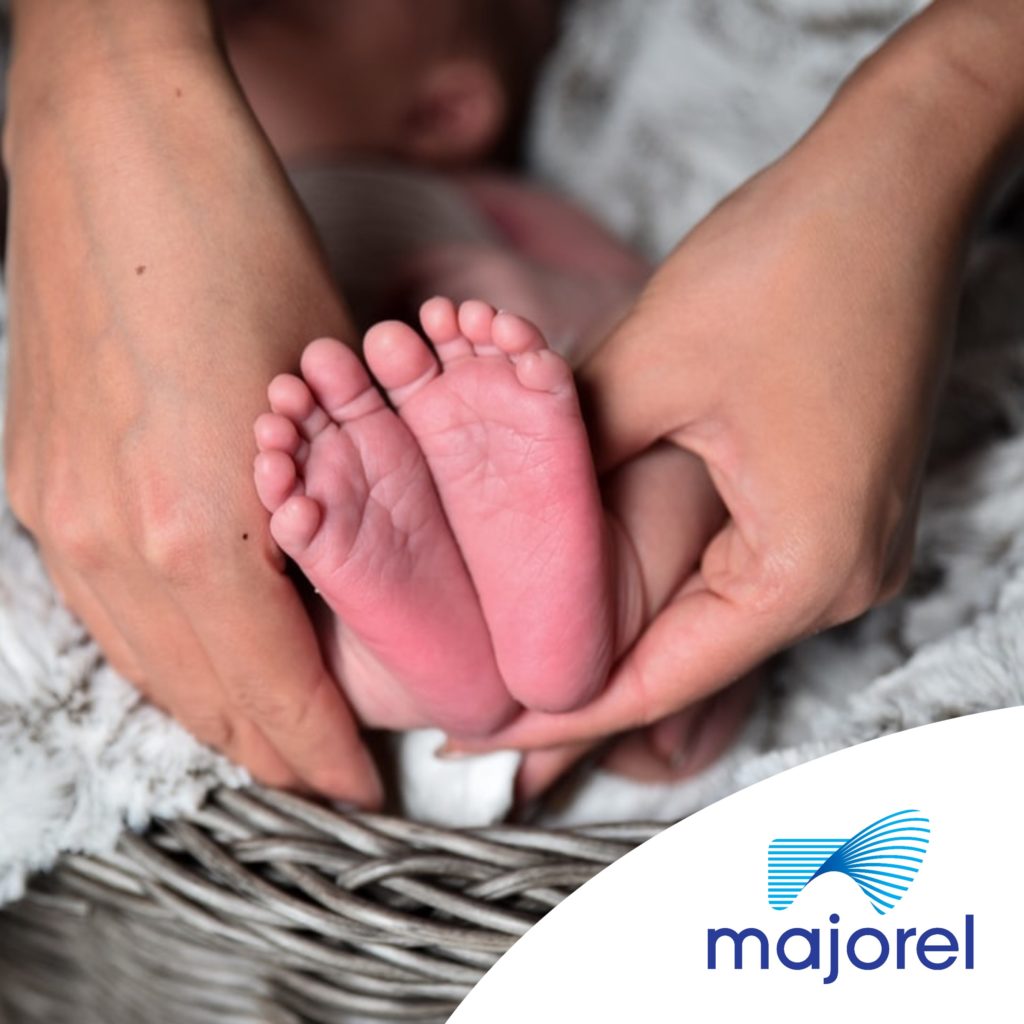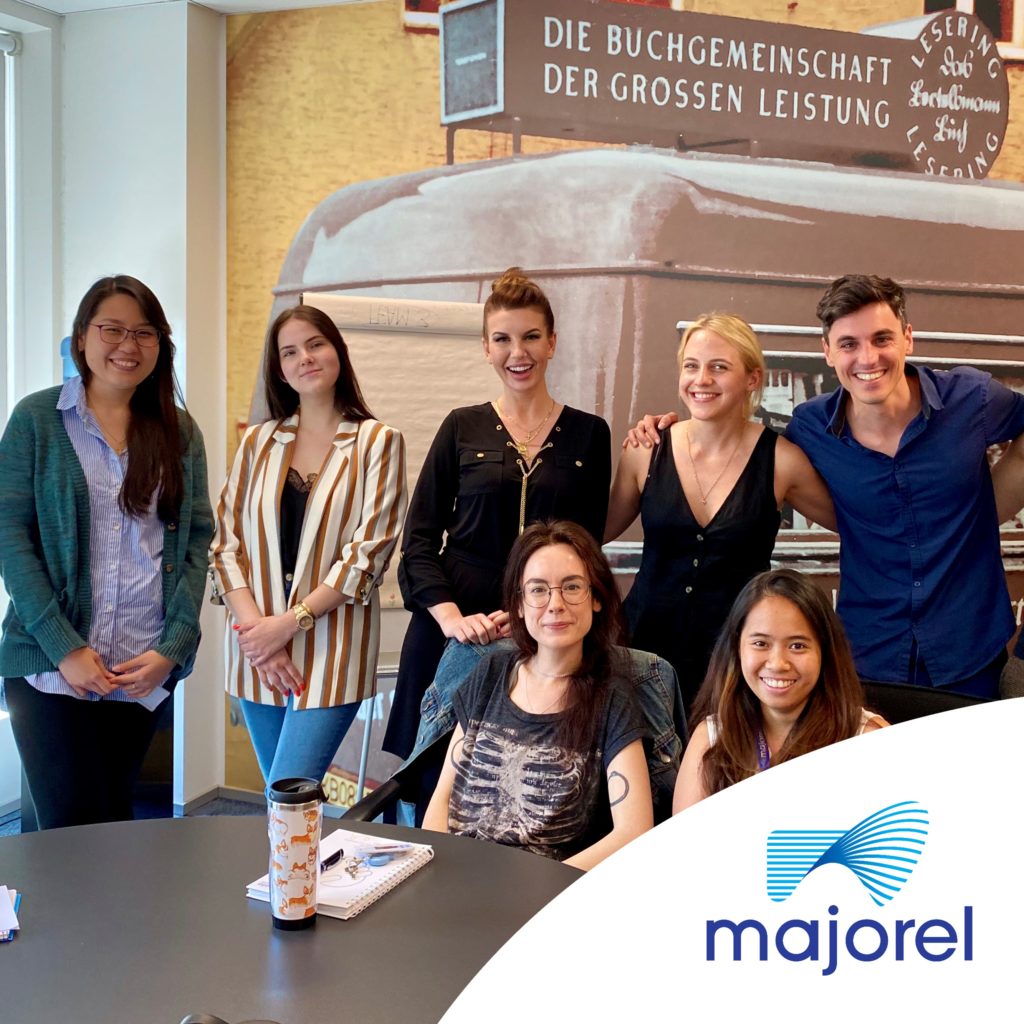
Meet Kseniia, Our Seasonal Trainer and Quality Coach

What do you do at Majorel?
I just moved to a Seasonal Trainer position in one of our biggest projects in Majorel Estonia. Outside of the high season I am working as a Quality Coach.
Why did you join Majorel?
First, I joined Majorel in January 2017. I was interested in challenging myself with working in the call center. My motivation was to step out of the comfort zone and make the best out of that experience. I understood it was not an easy job both emotionally and physically. But from the first moments of my journey here I have been supported by colleagues. One more thing which influenced my decision were numerous opportunities for career growth.
In March 2018, I got a temporary Coach position and gladly performed my tasks. After the high season was over, I decided to try myself in a different field. But very quickly understood that my heart belongs to our project. I got back to Majorel in March 2019 as a Coach, went through the Partner Support training. And now can proudly say I am an expert in both Guest Support and Partner Support lines of business.
What has been the biggest challenge for you here?
There have been some challenges at every stage of my journey in Majorel, of course. But the main challenge I am going through right now amid pandemic. Which is staying away from my team and my colleagues. I hope for it to be over soon, for us all to go back to a loud office full of great people!
What has been your favorite moment in Majorel?
I have many! I think every workday brings a lot of positive emotions, every team meeting energizes me, every event we have full of memorable moments.
But I think my most favorite moment was on 18th March 2019 when I came back to Majorel, entered the office, meet my dear colleagues. There was just peace and happiness inside, I was in the right place and I was ready to do my best with the work trusted to me.
What is it that makes you so good at your job?
I like challenges and I like winning them. I am constantly challenging myself with new goals and expected results. I also convey this attitude to the teams I manage. And together we show good results.
What advice would you give to someone who wants to pursue a career?
The advice will be not to be afraid. Not afraid to speak up, to show initiative, to think out of the box, and fail. Once failure can be the key to success. One more thing which is important is constant challenging of oneself, stepping out of the comfort zone, and aiming for personal development and growth.
What is your moto in life?
My motto is „Dreaming is an art of achieving“. I strongly believe that if you can dream about something you will eventually achieve it one way or another. It does work with me. All I have achieved, I have dreamed about in the past!
We have job opportunities in Tallinn, click here to go to our current job openings and find the perfect fit for you! We are looking forward to hearing from you soon!

Having a baby is one of the most important decisions a person will make in life. Bringing another human life into the world might seem a huge responsibility and even a bit risky, yet there are lots of benefits and support both Majorel and Estonian state or local municipality offer to future moms, dads and young families.
MAJOREL MARRIAGE SUPPORT
Majorel offers you 250 euros gross for getting married. Yay! Just send a copy of your marriage certificate to HR and you’ll receive the benefit within 2 weeks. If you have changed your last name please make sure that you have informed your bank about it, too. Please also note that the net sum of your marriage support depends on your salary and the taxation. You can always check the taxes that will be deducted from kalkulaator.ee. Just insert the overall gross sum you received this month, add your tax free amount and you will find out how big is the total net sum that you will receive (salary + support).
BEFORE THE BABY IS BORN…
MATERNITY BENEFIT / MATERNITY LEAVE
At the earliest, the maternity leave can start 70 calendar days before the estimated date of delivery. A gynecologist, family physician, or midwife must issue a maternity leave certificate. To receive the maximum amount of maternal benefit for 140 days, the maternal leave must begin at least 30 calendar days before the delivery date. When you start the maternal leave later, the benefit is decreased by the number of days that you delayed the leave by.
How is it calculated?
If you log in to emta.ee (Maksuamet/ Estonian Tax Board) you can see your income from the previous year. Please pay attention to the sum that says „taxed with social tax“. This is the sum that is basis for the calculations of your maternity benefit. The sum is divided by calendar days of the last year and multiplied with the number of days you are supposed to get the benefit, ie 140.
Let’s see how much money will Jana get if her maternity leave starts in November. Her income in 2019 was 17 000 euros altogether, before taxation. When we divide 17 000 with 365 days the result is 46,58 euros per day. When we multiply this number with 140 days the result is 6521,20 euros. Jana must pay income tax for this sum. Please note that Jana can declare some of her maternity benefit in 2020 and some in 2021, so she does not have to pay additional income tax. It applies to all ladies who will start their maternity leave within the last 3 months of the calendar year, i.e. in October, November or December.
What about Rita who’s baby should be born in February 2021? She could start her maternity leave in 2020 or she could wait a bit and start it in January 2021. If Rita starts her maternity leave in 2020 her maternity benefit will be calculated based on her income in 2019. But Rita received a huge bonus in 2020 and got a salary raise of 50 euros per month in April 2020. If she starts her maternity leave in January 2021 all those additional payments and pay rise will affect her maternity benefit in a positive way.
Be aware of when will you have your next payment. Maternity benefit can seem like a huge sum at first but you will not get much money in next 4 – 5 months. So maybe it is not a great idea to buy a new TV set or move your family to Bali for the winter? 😉 Maternity benefit is paid by the Health Insurance Fund (Haigekassa). More information about it is available on the Health Insurance Fund website.
PATERNAL LEAVE
If a child is expected or has already been born to the family, the father is entitled to 30 working days of paternal leave during two months prior to the expected delivery date until the child turns three years old. From 1 July 2020 instead of the previous 10 working days, the father has the opportunity to take 30 calendar days of paternity leave and to receive the parental benefit for that period. The additional benefit for fathers will also be paid to fathers who are not working.
AFTER THE CHILDBIRTH
REGISTERING THE CHILD
The new child must be registered at the population register before the child turns one month old. More detailed information about the child registration is available in the state portal section: Registration of birth and choosing a name.
MAJOREL CHILD BIRTH BENEFIT
Please send a copy of your child’s birth certificate to HR and you will receive within 2 weeks 241 euros to your bank account! We pay every employee entitled the child birth benefit of 250 euros gross. The good thing is that this benefit is not taxed with income tax, so even those who cannot use the tax free amount will receive the same sum.
CHILDBIRTH ALLOWANCE BY THE LOCAL AUTHORITY
Local governments pay childbirth allowances to newborns – either as one payment, or in several instalments. Usually, a prerequisite applies – at least one parent must have officially lived in the same municipality for at least 6 months to a year before the child is born. Please see the child allowance that Tallinn offers here: https://www.tallinn.ee/eng/Teenus-Childbirth-allowance.
NATIONAL CHILDBIRTH ALLOWANCE
Childbirth allowance is a one-time allowance in the amount of 320 euros paid when a child is born. If you are an Estonian citizen you do not have to apply for the allowance. If you and your family have moved to Estonia from abroad or you become entitled to an allowance due to, for example, adoption or guardianship or other, please contact the state through the self service portal or by e-mail at info@sotsiaalkindlustusamet.ee
CHILD ALLOWANCE
Child allowance is paid for each child, from birth until the child is 16. If the child continues their studies, the payments will also continue after the child turns 16. Family with one or two children eligible for the child allowance – 60 euros per child per month. Family with three or more children eligible for the child allowance – 100 euros per child per month starting from the third child.
Example. A family has three children: a 4-year-old, a 10-year-old, and a 17-year-old who studies at a high school. The family is paid 60 euros of child allowance for the first and second child, and 100 euros for the third child – which totals 220 euros.
PARENTAL BENEFIT/ SALARY
The parental benefit is paid to guarantee your previous income, as it decreases due to raising children. Before the child is 70 days old, only the mother is entitled to the parental benefit. After the child is 70 days old, any of the parents can apply for the parental benefit – meaning that also the father may apply. The parental benefit is paid for a period of 435 days, or until the child is one and a half years old.
The parental benefit is calculated based on the 12 months income that the parent had 9 months before the baby was born. You can calculate your parental benefit here: https://www.kalkulaator.ee/et/vanemahuvitise-kalkulaator (only in Estonian).
During receiving the parental benefit, it is allowed to earn income. If your monthly income is smaller than half of the maximum benefit amount (1774,05 euros in 2020; 1910,77 euros in 2021), then your parental benefit amount will not decrease. Should your income exceed this figure, we shall decrease the parental benefit amount paid out to you.
Similarly to a salary, the parental benefit is taxed with the income tax.
Simultaneously, the family can receive only one parental benefit. Should you or the other parent already receive a parental benefit and the next child is born before the current parental benefit period is over, the family is entitled to choose which of the calculated parental benefits to use. The parental benefit amount does not depend on the number of children.
Together with the family allowances, the state shall pay compensation for the parental benefit and maternity benefit gap, should your older child be under two years and six months of age, and the maternity benefit for one day is smaller than the parental benefit for one day.
ALLOWANCE FOR MULTIPLE BIRTH OF THREE OR MORE CHILDREN
One parent, custodian, or guardian of a family raising triplets or more multiple siblings are entitled to this allowance. The 1000-euro allowance per month is paid to the family until the children reach the age of 18 months. This allowance is paid automatically and you do not have to file a separate application for it.
ALLOWANCE FOR A FAMILY WITH MANY CHILDREN
If your family has at least three children for whom you are paid child allowance, your family will also receive the allowance for a family with many children. The allowance is bigger for families with seven or more children. You do not have to file a separate application for this allowance.
SUPPLEMENTARY CONTRIBUTIONS TO THE MANDATORY FUNDED PENSION
If you live in Estonia, your family has a child younger than 3, and you have chosen the II pension pillar, we shall pay a supplementary 4% of the average monthly Estonian income taxed with the social tax into your mandatory funded pension account.
IF YOU RAISE THE CHILD ALONE
SINGLE PARENT CHILD ALLOWANCE
The single parent child allowance is paid if your child’s birth registration does not contain any data about the child’s father, or if the other parent has officially been declared a fugitive.
MAINTENANCE ALLOWANCE
Maintenance allowance is meant for children, whose parent or parents do not fulfil their maintenance obligation. Maintenance allowance can be applied for both during the legal proceedings as well as the execution proceedings.
SURVIVOR’S PENSION
If a parent of the child has died, Estonian state will pay the child a survivor’s pension.
IMPORTANT LINKS
All about family benefits
https://www.sotsiaalkindlustusamet.ee/en/family-and-child-protection/brief-overview-family-benefits
Legal procedures and applying for benefits
Health Insurance Fund / Haigekassa
https://www.haigekassa.ee/en/people/having-child-child-health

Make your feedback have the impact it deserves. Your feedback can make a difference to people if you can avoid provoking a defensive response. These guidelines will help you help employees develop their performance.
Effective employee feedback is specific, not general
For example, say, “The report that you turned in yesterday was well-written, understandable, and made your points about the budget very effectively.” Do not just say, “Good report.” One of the purposes of effective, constructive feedback is to let the individual know the specific behavior that you would like to see more of from them. General feedback like a pat on the back makes the employee feel good momentarily but does not do a good job of reinforcing the behavior.
Useful feedback always focuses on a specific behaviour, not on a person or their intentions
For example, say, “When you participated in competing conversations during the staff meeting, while Mary had the floor, you distracted the other people in attendance. As a result, Mary’s point was partially missed.”
Successful feedback describes actions or behaviour that the individual can do something about
Ask the employee what they might do differently as a result of hearing the feedback. If you can, provide any tools, training, time, or support that the person needs to successfully perform as you need them to perform.
Whether the feedback is positive or constructive, provide the information as closely tied to the event as possible
Effective feedback is well timed so that the employee can easily connect the feedback with their actions.
Effective feedback involves what or how something was done, not why
Asking why is asking people about their motivation and that provokes defensiveness. Ask, “What happened? How did that happen? How can you prevent that outcome in the future? How can I have done a better job of helping you? What do you need from me in the future?”
Check to make sure the other person understood what you communicated by using a feedback loop
Set a time to get back together to discuss whether the feedback changed performance and whether any additional actions are needed.
Successful feedback is as consistent as possible
Want to find out more about us? Read here our story, mission and values!

In Estonia, Majorel has been in the forefront of hiring and having diverse and multicultural workforce for more than a decade.
It is not just about having our corporate policies and quotas to support diversity and inclusion, it is also about having workforce mirroring our world, our society, our client pool. And that is why embracing diversity is part of our DNA on corporate, but also individual level.
We are about moving to another level when it comes to cultural diversity and inclusion.
Last week for the second time already we organized a lecture for our employees to increase their awareness of cultural differences. It is one thing to approach differences with tolerance and acceptance, but it is totally another story making an extra effort in actually getting to know why the differences exist and how these differences with their uniqueness can enrich our lives and broaden our world – we increase our cultural intelligence.
Willingness to acknowledge that “my world is not the whole world” drives unity in diversity.
We see the world and perceive meanings through our own values and beliefs, we learn these so called “unwritten rules of social games” in communication, in behavior, in expectations we set to ourselves and others. All this affects how the relationships form among colleagues: what triggers our motivation, what we expect from our managers and how closely we are connected with our coworkers.
Sourcing from science, practicing in daily routines – this is how collective wisdom is created.
During this lecture, we did not just wonder about diversity, but also looked at cultural diversity through scientific prism. We shared some personal experiences and analyzed these situations by using scientific theory and research results and had lots of laugh about how amazingly simple and easily explained our differences actually are.
Want to find out more about us? Read here our story, mission and values!
Integrity and ethical conduct are at the heart of our code. Read here our Code of Conduct.

We often get asked how our recruitment process looks. The below shows our step by step recruitment process for entry-level positions in Majorel Estonia.
The application and the first email
Once you have applied for one of our positions and meet the requirements, you will receive an email where we explain the most important details of the position you are applying for, like the main duties and responsibilities, information about the training and salary steps. Our aim is to give you all important information first, so you can decide, if this position could be suitable for you.
The language assessment
The next step is a language assessment for the required language in the job description and English. The written test is an online assessment and it usually contains of three tests in total. You will have 30 minutes to complete each test.
The first interview
After the successful language assessment we will invite you to the first interview with a person from the department you are applying for. Usually it is either a team leader or a coach. During the interview you will be tested for your verbal language skills both in English and the required language in the job description. This first call is also about getting to know each other, share information and to talk about general working conditions. Our advice: ask everything you need to know, because it’s not only us making a decision but you as well.
The second interview
After the successful first interview we will invite you to a second interview with recruiter and the person in charge of the department you applied for. Here you will get a closer look on the tasks and can ask more specific questions about the job, for example: What does the training include? What does a typical day at work look like? …and so on. After this step the department will make their final decision after all of the final candidates have been interviewed.
The job offer
In the lucky event of a job offer we will send you an email with all of the details regarding the position and the offer. This gives you the chance to read through everything and to get in touch with us if anything is unclear.
Onboarding and the relocation process
Once you have accepted the job offer, we will prepare all of the necessary documents and paperwork for your first day with us. If you are joining us from outside of Estonia, we will help you with and advise you on the relocation process. Once you start the HR representative will help you get comfortable in, make sure you got everything you need to start your journey with us and of course introduce you to the Majorel family.
We have job opportunities in Tallinn, click here to go to our current job openings and find the perfect fit for you! We are looking forward to hearing from you soon!
Want to find out more about us? Read here our story, mission and values!
